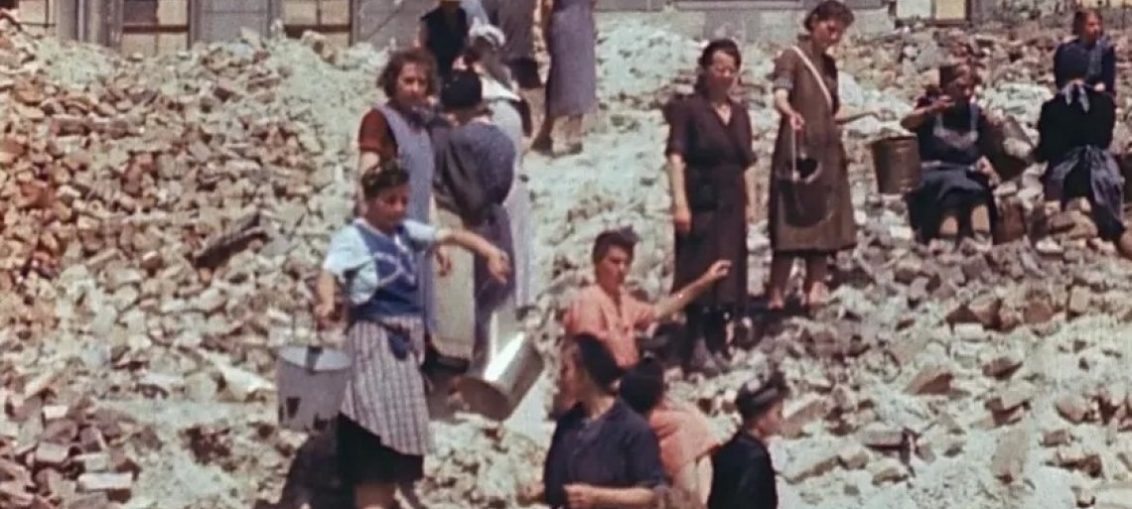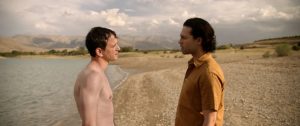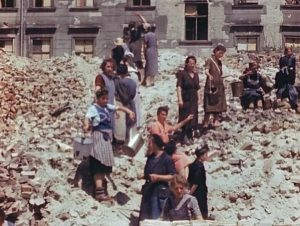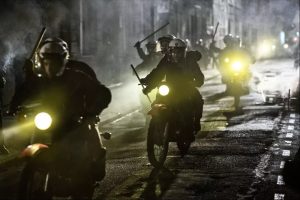
Cronenberg and Alper compared in the two main selections leave their mark on this edition which also addresses the theme of wars of yesterday and today, for this reason we wanted to highlight a photo from Sergei Loznitsa's doc
(from Cannes Luigi Noera and Marina Pavido – Photos are courtesy of the Cannes Film Festival)
 Art, chirurgia e mutazioni – Crimes of the Future
Art, chirurgia e mutazioni – Crimes of the Future
Great expectations at the Cannes Film Festival 2022 per Crimes of the Future, latest effort by Canadian director David Cronenberg, here in the running for the much sought-after Palme d'Or. In this important feature film of yours, Cronenberg resumed, therefore, a discourse that began in the seventies, going through a further stage of a process that began more than fifty years ago, in which the human body evolves, it undergoes important changes and also adapts to new technologies, in a world where, by now, technology itself plays the role of absolute protagonist.
Saul (played by Viggo Mortensen) he is a body artist capable of developing completely new organs within his body, surgically removed during his performances by his assistant Caprice (Léa Seydoux). Within a large group of artists who, while dealing with body art they seem to produce only junk art, the two seem almost the "survivors" in a world in which, by now, everything is focused on spectacularity, without thoroughly investigating the true essence of what surrounds us.
The questions Cronenberg raised in Crimes of the Future are anything but simple. Who we are? E, mostly, what are we becoming? In Crimes of the Future i mutamenti corporei vengono osservati come pure manifestazioni della bellezza nel senso più puro, although they are not always accepted as a natural process of transformation. Particularly significant, about that, is the figure of Brecken, a child, a sort of "creature" studied at the table, who is never accepted by his mother, scared that her son continues to eat plastic. His murder at the beginning of the feature film soon made him a sacrificial victim capable of making the whole world understand much "greater" truths.
Dark environments, disturbing music, beds with mutant shapes that adapt to the movements of the human body, surgical operations without anesthesia are the essence of this feature film. The human being no longer feels pain. Unlike, surgery itself is seen as a new evolutionary form of the sexual act. Con Crimes of the Future David Cronenberg ci ha regalato un’opera monumentale, magnetic and wonderfully disturbing. Un film che si è decisamente rivelato una spanna sopra la media delle opere presenti in questa 75° edizione del Festival di Cannes.
 Omicidi e amori impossibili – Decision to leave
Omicidi e amori impossibili – Decision to leave
Another great name present, in competition, at this 75th edition of the Cannes Film Festival is the famous Korean director Park Chan-wook. On this occasion, indeed, the filmmaker gave us Decision to leave, a refined yellow with a passionate love story in the background, that does not disdain even a welcome, veiled irony.
The body of a man - probably fallen during a mountain climb - immediately catches the attention of the police. It must have been an accident or a murder? Detective Hae-joon is in charge of the case. Crucial during the investigation process, the wife of the deceased, the charming Sao-rae, who comes from China and has a controversial past behind it. Something immediately clicks between the two, but their love seems destined to never find its own fulfillment. What all this will lead to?
Decision to leave è indubbiamente un film ben scritto, in which a direction attentive to every detail, perfectly capable of mixing tension, irony and highly evocative moments reveal the true peculiarity of the film. Perfectly in line with the style of Park Chan-wook, however.
Il problema principale di un film come Decision to leave, however, is that, thinking back to the important and prolific career of the director, we sadly realize how he is, today, fails to match some of his past masterpieces (la Trilogia della Vendetta, eg, speaks for itself). HE, therefore, this feature film can easily be classified as a good film overall (with not a few highlights inside, among all the heartbreaking final scene), albeit with some too long, especially with regard to the central part, we cannot fail to rethink with nostalgia what Park Chan-wook has given us in the past. The glorious times seem long gone. Who knows if they will come back to cheer us up even in the near future.
 Solo contro tutti – Burning Days
Solo contro tutti – Burning Days
The power. The corruption. Human rights that are never respected and a strong one, strong desire for justice. In his latest feature film - Burning Days, world premiere at the 75th edition of the Cannes Film Festival, within the Un certain Regard section - Turkish director Emin Alper staged all of this, giving life to an overall satisfying thriller, in which a young hero finds himself dealing with a reality much greater than himself.
Emre, therefore, is a young prosecutor who is sent to a remote village in Turkey. Here the corruption is very high and, when he finds himself interested in problems such as ecology, the water supply and well-being of his fellow citizens, the local authorities will do everything to put a spoke in the wheel. The things, Furthermore, they will take an even more dramatic turn the moment, after having dinner with two local personalities, the man will be drugged and drunk. That same evening, the two men will rape a girl with mental problems who went to them to entertain them with some music and dancing.
A rough realism - which finds its ideal location in shabby houses, in small village streets stained with blood after a bloody wild boar hunt and in huge expanses of sand - it turns out to be the ideal solution to stage the drama of the young Emre. The country where the protagonist was sent would seem almost a small universe unto itself, in which, however, the diseased interests and dynamics are almost reminiscent of those of a large urban center.
Interesting to note, about that, how the director has opted for a staging that, as the story progresses, seems to increasingly resemble a US-style thriller. Burning Days è un lungometraggio complessivamente pulito e privo di sbavature, while not particularly shining for originality, both in terms of the issues and the directorial approach. But anyhow. Emin Alper knows his stuff. E in questo Festival di Cannes 2022 however, he distinguished himself with dignity.
Fuori concorso due film potenti, il primo un documentario sulla guerra, che sia la IIWW non ha importanza, il secondo su un tema sempre attuale: la giustizia.
 La Seconda Guerra Mondiale da tutti i punti di vista – The natural History of Destruction
La Seconda Guerra Mondiale da tutti i punti di vista – The natural History of Destruction
Ukrainian director and documentary maker Sergei Loznitsa is known for the painstaking archival work he carried out before the making of each of his films. Footage and archive images, expertly assembled with each other and semantically linked through the use of music that becomes essential actresses in telling what the filmmaker wanted to stage, they are part of, by now, of its trademark. Through its cinema, contemporary and past history has come to life in a lively and pulsating way on the big screen, as only a careful and courageous look could do.
Perfectly in line with the rest of his filmography, therefore, il documentario The natural History of Destruction – presentato in anteprima in occasione della 75° edizione del Festival di Cannes all’interno della sezione Special Screenings – ci mostra un capitolo cruciale della storia mondiale del secolo scorso, offering us varied points of view and great images, great emotional impact.
We are in a small village in 1940s Germany. Life seems to go by quietly, between days spent having lunch all together in the open air, musicians singing cheerful tunes along the road and farmers taking their animals to pasture. Then, suddenly, everything changes. War is upon us and these convivial atmospheres seem only a vague memory.
The powerful explain what moves them to carry on the war. Who pays the costs, as always, they are civilians. Stock footage taken from flying planes intent on dropping bombs on the enemy country hit like a punch in the stomach. And even more impressive are the images of the wounded being transported on a stretcher after a bombing, of bodies arranged in a row awaiting burial e, not least, of images taken from above of completely destroyed cities, in which of the only buildings left standing only the external facade remains.
The natural History of Destruction è un documentario tristemente attuale, which shoots to zero on both factions, who screams his anger against a painful past that in the present we live in sees too many holds. The unmistakable approach of Sergei Loznitsa, then, does the rest and in a careful work of selection and editing of archive footage, he sees no need for redundant captions.
Once again, the Ukrainian documentary maker has been able to write a fundamental chapter in recent history, offering us, at the same time different perspectives and different food for thought. Il suo The natural History of Destruction si è rivelato ancora una volta uno dei prodotti più interessanti e ricercati della celebre manifestazione cinematografica.
 Un forte desiderio di giustizia – Nos Frangins
Un forte desiderio di giustizia – Nos Frangins
In December 1986 - when Jacques Chirac was in power - they occurred, Paris, rather serious facts: during some student demonstrations following a reform of the school and university system, Abdel Benyahia, a boy of twenty, he was killed by a drunk policeman. Subsequently, young Malik Oussekine was also beaten to death by three policemen. Abdel's death will initially be obscured by the authorities in order to exonerate the policeman. How long will it last, however, this farce?
Director Rachid Bouchareb staged, therefore, tali drammatici avvenimenti nel lungometraggio Nos Frangins, presentato in anteprima in occasione della 75° edizione del festival di Cannes all’interno della sezione Cannes Prèmiere, showing us the facts from the perspective of the victims' families and shooting at zero, at the same time, against those who held power.
Nos Frangins è un film “arrabbiato”, a desperate call for justice, a feature film that you find in events that took place more than thirty years ago, Unfortunately, several holds even in the present. A tal fine, the directorial approach adopted is strengthened by the tradition of French noir, but also of American thrillers, betting everything, at the same time, on heart-pounding rhythms, on city streets at night, on dimly lit apartments and on characters barely illuminated by cold neon lights.
La messa in scena adottata fa sì che il presente Nos Frangins si classifichi a tutti gli effetti come un thriller di impostazione classica complessivamente dignitoso, that, while lacking its own marked personality or any (but in this case, probably superfluous) directorial virtuosity, gives us a raw and highly impactful story through an objective point of view that is not afraid to highlight even the most "uncomfortable" aspects. Interesting from a content point of view, but without infamy and without praise as regards its realization, Nos Frangins è un film che, probably, will receive a lot of acclaim around the world.
marina fears
